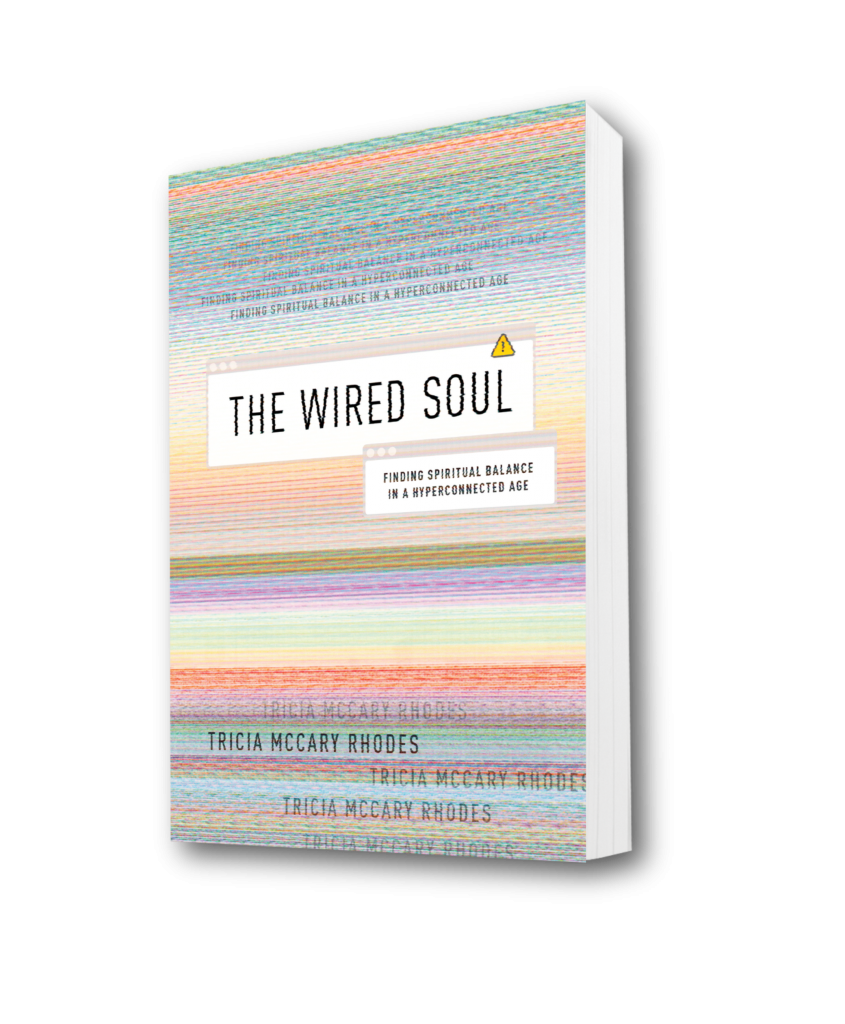Wherever we go and whatever we do, we are connected—from our cars to our bedrooms, from our desks to our coffee shops, from our churches to our kitchens. Amidst the ever-pinging text messages, the beeping backlog of emails, the plethora of posts, pokes and pics on social media, as well as the expectation that we must be instantly available to everyone—friend or foe—who might contact us, we feel permanently tethered to our devices, as if they are some sort of technological umbilical cord connecting us to the universe.
What is it that makes us move mindlessly through our days, caught in the swift-moving current of a digital culture that waits for no one? Perhaps more importantly, what is all of this doing to the state of our souls? If the Spirit of God wanted to capture our undivided attention, what might he ever so gently whisper? And could we hear him amidst the cacophony of cyber-static that surrounds us?
I am disturbed at the spiritual losses that seem to be piling up, not only for individuals and families, but for the church at large, as a result of our wholesale and uninformed immersion into this digital universe. God has imbued our souls with certain capacities that are essential for knowing him and making his presence known in the world—things like reflection and meditation, communion and compassion, contemplation and listening, awareness and even prayer. These and others are at risk, in part because of the frenetic nature of our lives, but more importantly because of the impact technology is having on our brains. Simply put, the neurological activity between our ears, which is greatly affected by our digital habits, has a direct link to our formation into Christlikeness. I believe the time has come for us to grapple seriously with this.
An Honest Assessment
Are there moments when you sense that your life is out of balance, that somewhere along the line you’ve lost control of how you manage your time and energy? Let me ask this another way: Can you say with confidence that technology is a servant to your needs rather than a silent taskmaster over you? Perhaps you’ve not really thought about it, but consider this: Do you ever
- go online to read or watch something or check social media, and end up spending an hour or more lost in hyperlinks, while feeling like you have nothing to show for it?
- feel compelled to check immediately when you hear a ping for a text, email, or phone call, regardless of who you are with or what you are doing?
- ignore the people who are right there with you as you play games online or engage in social media?
- set aside a time for quiet prayer or reading for pleasure, but feel so antsy you can’t get anything out of it?
If you found yourself answering yes—as most probably would—you are living out some of the negative consequences of a hyperconnected life. But here’s the thing: Have you ever taken the time or invested the energy to consider what impact this is having on your walk with God? Do you ever honestly assess how your engagement with technology may be forming you as a spiritual being? You do not have to be an unwitting victim of digitization. The truth is that God has given us all we need to recapture the capacities we need for our soul’s well-being, and to bring spiritual balance to our life.
How? Surprisingly, the answers begin with the study of the human brain called neuroscience, which has not only discovered the ways that technology may be reshaping our brains, but also offers great hope for turning things around.
This Is Your Brain on Technology
When I was in third grade, a stout, grey-haired, no-nonsense Sunday school teacher who showed up every week in the same charcoal suit and white silk blouse, stunned our entire class by cracking a raw egg into a glass of beer, soberly warning us that the egg represented our brains. “This is your brain on drugs. Any questions?”
Aside from the fact that the texture of a brain is more like a bowl of Jell-O than the contents of an egg shell, these examples rightfully allude to a more recent, astounding scientific discovery: Our brains have the property of plasticity. This means that rather than being hardwired in the womb, as was once assumed, our brains are always changing, even into adulthood, making constant adjustments over the course of our lives based on our everyday actions and experiences.
“Cells that fire together, wire together.” In short, the more you engage in any one thought process or behavior, the more regularly specific brain cells fire together, and thus the deeper entrenched those supportive neural pathways become. This is how you establish habits and form mental models that end up determining, in large part, your way of being in this world.
What are the spiritual implications of this? Our ever-increasing engagement with technology is deepening neural pathways that make it difficult to maintain practices that are essential for soul care. For example:
- Our habit of continually switching from one thing to another on our devices trains our brains to seek constant stimulation, and this makes it hard to spend focused time connecting with God.
- The way we skim when we are on the internet trains our brains for shallow thinking, so we struggle to take in transcendent truths that reveal the profound beauty of Christ.
- Compulsive texting, playing video games, and engaging in social media train our brains to neglect the person in front of us, robbing us of the awareness we need to be salt and light or to love our neighbors as ourselves.
These are just a few of the ways that our hyperconnected lives may be imperiling our walk with God.
Finding Our Way Out
I hope you can see here that the stakes are too high for us to ignore. Yet because our brains have this marvelous capacity to adapt, we have hope: We really can take control of technology and make it work to our advantage. In fact, if you were to peruse a score of the latest books on technology and the brain, you would discover recommendations for a number of activities that promise to do just that. Most of these recommendations are based on secular research, but are practices that were laid out in Scripture thousands of years ago.
Studies indicate, for example, that reflection contributes to a well-rounded mind and an ability to “thrive in a complex, ever-shifting new world.” Meditation strengthens your brain and is a “stepping stone to becoming more compassionate, calm, and joyful.” Prayer can lower your propensity to anger and increase empathy. Contemplation can actually cause your brain to grow.
In The Wired Soul I offer fresh ways to engage with many of these ancient spiritual practices. They can help you become a better steward of your digital life as you rewire your brain. To that end, we will explore four categories of our spiritual journeys, each one symbolized by a component from a discipline called lectio divina (“sacred reading”), which I use as  a metaphor to frame the conversation. Here is a short synopsis of what you can expect:
a metaphor to frame the conversation. Here is a short synopsis of what you can expect:
Lectio—to read. This section will examine why we struggle with focus, and how our waning capacity to do so is affecting our ability to think deeply. It includes simple practices like deep reading and memory enhancement that can help us regain clarity and improve our ability to concentrate.
Meditatio—to meditate. This section looks at the various ways technology breeds distraction and, as a result, a shallow spirituality. It includes practices like God-focused deep breathing and biblical meditation, designed to settle our minds and hearts, and enable us to deepen our grasp of God’s ways, works, and Word.
Oratio—to pray. Here I explore how we have unwittingly yielded control over our thoughts and behavior to others, as well as the deficits we face relationally as a result of digital idolatry. It includes practices designed to restore personal balance and foster authentic community through greater consecration.
Contemplatio—to contemplate. This section considers how we lack awareness of God and his heart, both in times alone and as we move about in the world, due to the pace we feel pressured to maintain. It includes practices that foster a vision of God’s love that both infuses us and informs our way of being in the world.
A Final Caution
I read recently that the amount of time we spend online, whether via computers, tablets, or smartphones, is becoming so hazardous that we will one day look back with attitudes much like those reflected today toward smoking—distress at the price we have paid, indignation that no one warned us of its perils. At the risk of overstatement, I have to say that this is the reality that troubles me day and night, and has driven me to write this book. I am convinced that if we don’t wrestle with these issues now, we risk forfeiting our destinies and those of generations to come to the tyranny of technological urgency.
Yet, as much as I’d love for scores of people to read this book, I must caution you that reading alone will bring no lasting change to your spiritual life. If I’ve learned anything from my own journey and the variety of sources I’ve consulted as I’ve written this book, it is that transformation comes not through what we know, but through what we do with it—or, in other words, through the practices we keep. The only way to effectively override unhealthy patterns of behavior is to establish new habits of life.
To that end, I pray fervently that you will take the practices in each chapter seriously enough to engage in them with determination and diligence. If you do, I believe you will be refreshed and invigorated as your brain is rewired, and you will find the balance you need to live in this hyperconnected world. Over time, your spiritual journey will deepen as your life is transformed for the glory of our Lord and the joy of your own heart.
Continue reading The Wired Soul or check out author Tricia Rhodes’ blog at Soul at Rest. You can also learn more about the book directly from Tricia by watching her introduction to the book at thewiredsoul.com.



Thank you for building awareness of how the distraction of technology can block God’s creation from knowing and experiencing Him.